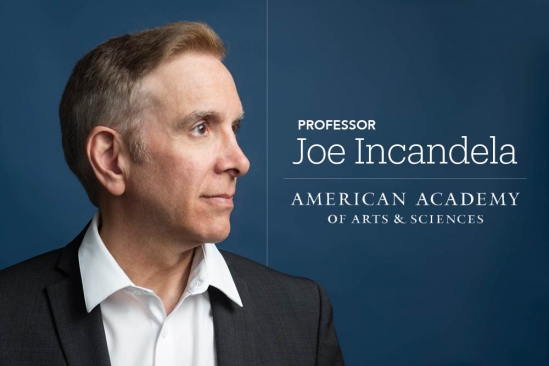Member of the Academy

Joseph Incandela, professor of physics at UC Santa Barbara and the campus’s vice chancellor for research, has been elected to the American Academy of Arts and Sciences. He joins more than 250 other new fellows and international members of the prestigious organization. His selection brings to 42 the number of UC Santa Barbara faculty members who have been named fellows of the academy.
The academy is an independent research center that convenes leaders from across disciplines, professions and perspectives to address significant challenges. Founded in 1780 by John Adams, John Hancock and others who believed the new republic should honor exceptionally accomplished individuals and engage them in advancing the public good, the academy named luminaries such as George Washington and Benjamin Franklin among its first fellows. Since then, more than 13,000 individuals have been elected to academy membership, including Thomas Jefferson, Alexander Hamilton, Maria Mitchell, Charles Darwin, Albert Einstein, Jonas Salk, Margaret Mead, Edward K. (Duke) Ellington, Martin Luther King, Jr., Anthony Fauci, Bryan Stevenson, John Legend, Viet Thanh Nguyen and Anna Deavere Smith.
“It is a special honor for our campus to congratulate our Vice Chancellor for Research Joe Incandela on his election to the American Academy of Arts and Sciences,” said UC Santa Barbara Chancellor Henry T. Yang. “The Academy has a long and esteemed history of working across disciplines to promote the common good, and Professor Incandela’s world-renowned research in the field of particle physics has done just that — uncovering a deeper understanding of our own origins and the mysteries of our universe. We are immensely proud that Professor Incandela’s pioneering leadership contributions to advancing research, propelling the arts and sciences, and improving society have been deservedly recognized by his peers in this meaningful way.”
David Oxtoby, president of the American Academy, said, “We are honoring the excellence of these individuals, celebrating what they have achieved so far, and imagining what they will continue to accomplish. The past year has been replete with evidence of how things can get worse; this is an opportunity to illuminate the importance of art, ideas, knowledge, and leadership that can make a better world.”
Incandela, who holds the inaugural Joe and Pat Yzurdiaga Chair in Experimental Science, joined the UC Santa Barbara faculty in 2000 as a professor of physics, after spending a decade at Fermi National Accelerator Laboratory where he played an important role in the discovery of the top quark, the heaviest known elementary particle, in 1995. For the past two decades, he has been involved with the Large Hadron Collider at the European Organization for Nuclear Research (CERN), initially leading the construction of a large part of the particle tracking system for the Compact Muon Solenoid (CMS) Experiment before joining the team coordinating the physics program in 2007. He was named deputy leader of the experiment in 2010.
In early 2011, Incandela was the first American elected to lead the CMS experiment, with more than 3,000 scientists and engineers from 39 countries. Under his leadership, the collaboration confronted and overcame new challenges associated with record high intensity proton beams to uncover strong evidence for the highly sought Higgs boson, validating a 50-year-old theory about the nature of the Universe. Incandela announced the CMS discovery of the Higgs boson at CERN on July 4, 2012.
Incandela remains actively involved in the CMS experiment, where his group searches for new elementary particles and processes, and where he plays a leadership role in the design and construction for a technology upgrade of the detector, to be installed around 2026. He is applying the same technology in a lower-energy experiment he co-proposed to search for dark matter particles in a very promising mass range that has never before been accessible. The dark matter experiment will operate at the SLAC National Accelerator Laboratory at Stanford University.
The recipient of numerous honors and awards, Incandela received the 2013 Special Breakthrough Prize in Fundamental Physics as well as the 2013 European Physical Society High Energy Physics Prize. He is a member of the National Academy of Sciences and a fellow of both the American Physical Society and the American Association for the Advancement of Science. In 2016 he was selected as the UCSB Faculty Research Lecturer, the highest honor bestowed by the university faculty on one of its members.
Also elected to the academy is UC Santa Barbara alumna Dawn Wright, chief scientist at the Environmental Systems Research Institute. Wright completed her interdisciplinary Ph.D. in physical geography and marine geology in 1994.